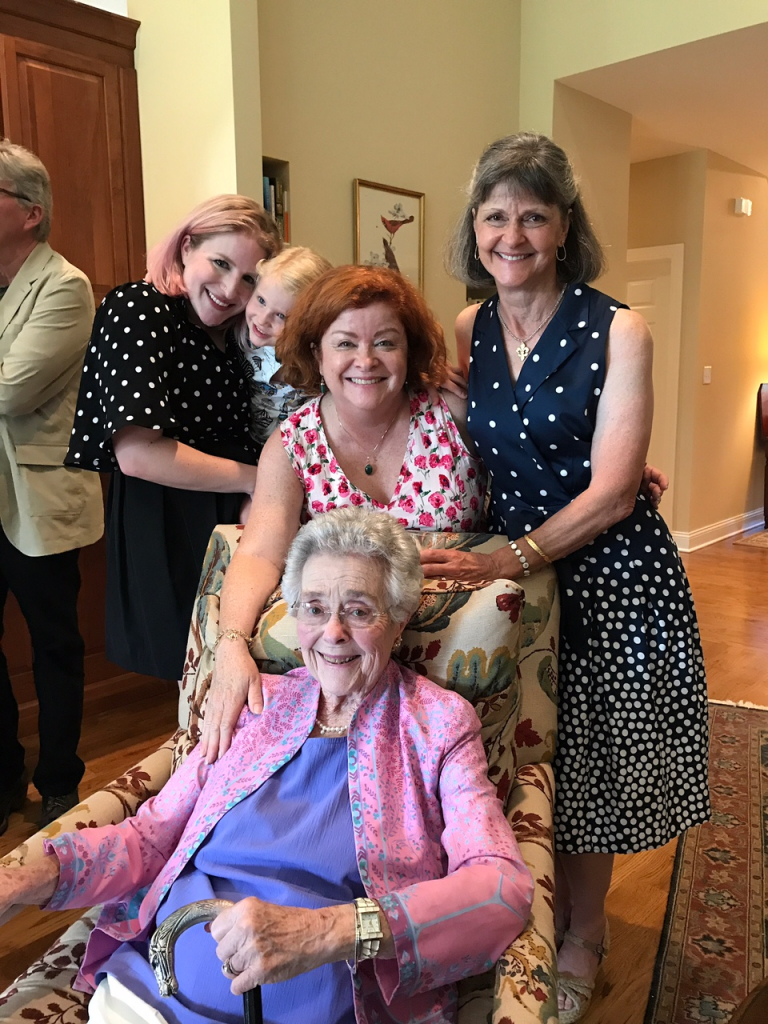
A few years back, a well-intentioned therapist probing my history for signposts tried to steer me down the Mother Track. It must be routine and fruitful territory in her line of work. It was high on her list of questions, and she seemed mildly surprised by my responses.
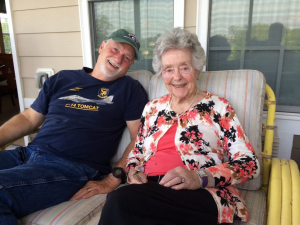
“Did you resent your mother when you were growing up?” she began. Not that I can recall, I answered. “Was your mother around when you needed her?” it continued. My mother was ill for a period of time when I was an adolescent, but otherwise, always, I replied. She tried one more time: “Did you feel that your mother understood you?”
It didn’t take me long to resent the implication that most people have Mother Issues. Therefore, if I didn’t readily confess some, I must be in denial.
“My mother is a lovely person,” I countered, impatient at this presumption. “I can barely remember arguing with her over anything that mattered. She’s kind to everyone, including us. Everyone loves her—puppies, babies, men, appliance repair people, tax accountants, everybody. ”
She took the hint and moved on, but I pondered the question later, searching my heart to make sure I wasn’t ignoring something important. Did Mom miss any major milestones in my life? I pictured her leaning over the gurney when I was being wheeled in to deliver my daughter. Nope. Did she favor one of the four of us over others? My younger sister was her kindred spirit, the soul most like hers of all her children, so it always seemed they understood each other on a deeper level. Did that connection serve to deprive the rest of us? I can’t see it that way. Did she disapprove of my choice of husband? Maybe, but she kept it to herself and adopted him as one of her own, succeeding far better in understanding him than I did as a wife. She grieved when we divorced, but never criticized that life-changing fracture in the family.
So, maybe it defines me as an outlier when it comes to Five Therapeutic Fundamentals that Work for Most of Us, but I loved my mother growing up. However, emulating her was something else altogether.
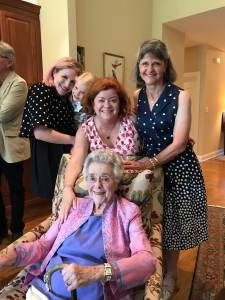 In the cultural tumult of the Sixties and Seventies, when the roles of women changed forever, we so often thought (sometimes rightly, sometimes not) we knew better than the previous generation. I never really wanted a life like hers. While she would be the first to point out she was not born to such things, my mother was, in my eyes, bridge and country clubs, stunning ball gowns and cocktail parties—while I was smoky blues bars, horse barns, jeans and bandanas, and bad boys. Our family of six lived comfortably on my father’s income, while I instinctively knew I would always have to pay my own way. As a working mother, later a single one, I juggled priorities that sometimes seemed a world away from Mom’s daily life, through no fault of either of us. It was easy to assume that my father, in our traditional family structure of the era, was the tough one in the family.
In the cultural tumult of the Sixties and Seventies, when the roles of women changed forever, we so often thought (sometimes rightly, sometimes not) we knew better than the previous generation. I never really wanted a life like hers. While she would be the first to point out she was not born to such things, my mother was, in my eyes, bridge and country clubs, stunning ball gowns and cocktail parties—while I was smoky blues bars, horse barns, jeans and bandanas, and bad boys. Our family of six lived comfortably on my father’s income, while I instinctively knew I would always have to pay my own way. As a working mother, later a single one, I juggled priorities that sometimes seemed a world away from Mom’s daily life, through no fault of either of us. It was easy to assume that my father, in our traditional family structure of the era, was the tough one in the family.
Most likely I was too absorbed in my own problems, in too much of a hurry, too perennially distracted to develop the wisdom to appreciate my mother’s character. Instead, I saw myself as different, not really cut from the cloth of her lifestyle and traditional family roles that were so easy, in those heady times, to disregard. Maybe daughters always think they know more about their parents than they really do. Could I ever be the person she was and is, or should I be?
The circle of life brought that question back around recently.
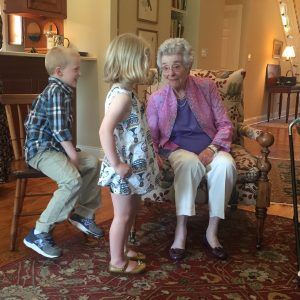
The phone rang early on Sunday morning, on Mother’s Day, ironically. The screen showed my brother’s name and photo, and my stomach clenched. When one has elderly parents, it is never a good thing when the phone rings at an unexpected hour. Sure enough, this was one of those. My brother, a veteran of many difficult phone calls, kindly began with the encouraging end of the painful news. “Mom’s OK now, but we thought you’d want to know she fell during the night,” he reported. “She banged herself up pretty good, bruised her wrist badly and cut her forehead, but thankfully, nothing was broken. We took her to the hospital, just to be sure everything checked out OK.”
How is she now? I asked fearfully. Sore? Confused? “I’m sure she will be sore tomorrow,” he said, “but she said she is fine and seems like she really is.”
I called her a couple of hours later, anxious to hear her voice for myself. “My arm is throbbing a little bit,” she admitted, “but nothing that a couple of ibuprofen won’t take care of. I can handle that.” That last sentence was delivered with the slight edge that emerges in her voice when the point is not to be mistaken or disputed.
My sister, who like my brother lives just a few minutes from Mom, dropped by with her husband to check in later, then delivered another update. “You can’t see the cut on her head, I promise,” she confirmed. “She’s wearing the sweater you gave her for her birthday, with pearls, and I swear she looks fine.” She’s wearing pearls? I echoed, amazed. After being at the ER in the middle of the night? My sister sent the photo above as evidence. She captioned it The Invincible MM. (MM is short for MartyMom, the name her grandchildren call her.)
What, I wondered for the umpteenth time in the last couple of years, gives a person that kind of strength?
Surely, the circumstances of upbringing generate roots for the character. Born in the spring of 1931, my mother is a young member of what journalist Tom Brokaw christened The Greatest Generation in his book of the same name. Mom was too young to have immediate contemporaries fighting in World War II, but plenty old enough to have experienced and remembered the sacrifices and the preceding Depression. Brokaw described the age group this way: “It may be historically premature to judge the greatness of a whole generation, but indisputably, there are common traits that cannot be denied. It is a generation that, by and large, made no demands of homage from those who followed and prospered economically, politically, and culturally because of its sacrifices. It is a generation of towering achievement and modest demeanor, a legacy of their formative years when they were participants in and witness to sacrifices of the highest order.”
Along with the times in which she has lived, there are the bonds of love and family that serve to mold the soul. An only child adored by parents, aunts, uncles, and countless friends, my mother left her parents’ home to marry a man who loved and cared for her for nearly seventy years—literally, in sickness and in health, until they were parted by death. Not that there weren’t tough times. Every family has them, and ours was no different, though the bonds were not weakened by circumstance. Does a foundation of unwavering love inspire a lifetime of courage and good humor, stalwart good spirits in the face of suffering?

It’s impossible not to look inward with these questions. Will I have that determination and grace if the fates allow me to reach my mid-eighties? Deep in my heart, I am skeptical. Self-pity and slights claim me all too quickly; remembering the many blessings of my own family and life is a daily effort in which I don’t always triumph. What if I become one of the grouchy ones, whose pain and isolation drive wedges between them and those who love them best? Is it too late to hope something of my mother is inside there, deep down?
It is funny to think, at the age of sixty, that it’s finally time. I want to be more like my mother, when I grow up.







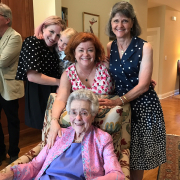


 In the cultural tumult of the Sixties and Seventies, when the roles of women changed forever, we so often thought (sometimes rightly, sometimes not) we knew better than the previous generation. I never really wanted a life like hers. While she would be the first to point out she was not born to such things, my mother was, in my eyes, bridge and country clubs, stunning ball gowns and cocktail parties—while I was smoky blues bars, horse barns, jeans and bandanas, and bad boys. Our family of six lived comfortably on my father’s income, while I instinctively knew I would always have to pay my own way. As a working mother, later a single one, I juggled priorities that sometimes seemed a world away from Mom’s daily life, through no fault of either of us. It was easy to assume that my father, in our traditional family structure of the era, was the tough one in the family.
In the cultural tumult of the Sixties and Seventies, when the roles of women changed forever, we so often thought (sometimes rightly, sometimes not) we knew better than the previous generation. I never really wanted a life like hers. While she would be the first to point out she was not born to such things, my mother was, in my eyes, bridge and country clubs, stunning ball gowns and cocktail parties—while I was smoky blues bars, horse barns, jeans and bandanas, and bad boys. Our family of six lived comfortably on my father’s income, while I instinctively knew I would always have to pay my own way. As a working mother, later a single one, I juggled priorities that sometimes seemed a world away from Mom’s daily life, through no fault of either of us. It was easy to assume that my father, in our traditional family structure of the era, was the tough one in the family.

